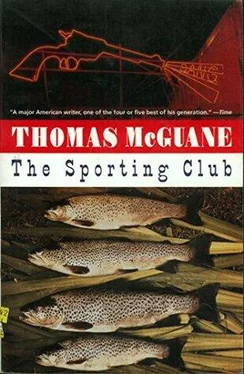“Nothing. What are you?”
“An older woman with a little something put aside.”
“Really—”
“I don’t know. Waiting for something to change.” Beside him bacon, eggs and broiled tomatoes warmed in a silver chafing dish with a lamp beneath. He lifted the lid and looked in carefully. Janey wouldn’t have any so he served himself on a square-handled salver. After that, Quinn dressed slowly while Janey watched out the window. Then they went to the compound to view the damage.
The destruction of the lodge was total. Only the plumbing stood out of the wreckage, white fixtures on pipe legs like mangrove hummocks. The cellar hole had begun to fill with water. The quantity of shattered lumber was astounding. In the compound there stood a huge carnival tent, now quite dark from rain. Around the entrance many club members were smoking and talking. The men were unshaven and disheveled. Quinn went inside with Janey. The rest of the membership was in here, their sleeping bags strewn over an acre or so of interior ground. There was a queer relaxation, a locker room air, people standing around in underwear, picking, fingering and itching at themselves. Something had gone with the buildings.
Quinn and Janey continued to walk through the tent even after the others had gone out to listen to Spengler read the prologue to his lecture. A man from the company that had supplied the tent was draining two great rain puddles that had formed overhead by incising them with a razor on the end of a twenty-foot bamboo pole. These dark ponds hung like blisters until the cut was made; then they vanished in a leaf of silver that hurtled to the floor where he mopped it up. Later, he would go aloft and stitch up the incisions.
They went outside and sat down. Quinn smelled the soaked ashes and embers, the clean pitch that had boiled out of the timbers of the lodge and been slaked with cold water. Spengler announced that he would in this time of crisis review the acquisition of club lands and summarize its social history with a view toward highlighting that spirit which went to make it the great institution which it was today. Stanton was heard to say, rather too audibly for comfort, “This ought to be good.” The review began, the dreary account of acquiring the miles of both banks of the Pere Marquette that they had today. It soft-pedaled the succession of magnificent bribes that had been necessary (two greedy Presidents had clamored for ample lacings of this payola) to uproot the homesteaders and loggers who had settled in the area; when these hardheaded Scandinavians refused to move, no matter what papers or signatures were shown them, a feeling grew among the original club members that the intransigence of the hayseeds was criminally uncalled for; and that if they wanted to play rough, then play rough it was. Moreover, the founders decided, if, when push came to shove, these hicks tried to wave the Homestead Act of 1862 in their faces, then the founders would be obliged to sic the law on them. Open conflict set in and when the farmers appealed to decency, it was regarded as being neither here nor there, rather a canny bumpkin subterfuge not only not to be honored but not to be countenanced. Therefore, the reward of these farmers was entailment succeeded by dispossession. They were driven from the land, their minor prosperity undone and, to this day, unrecovered. They resettled close beyond club boundaries and their progeny and heirs produced the poachers and vandals that plagued the club today; they had produced Jack Olson for one.
They had land; now they needed buildings. At this time there was great interest in Indian life on the eastern seaboard and it was carried inland to Michigan through the efforts of a French scholar, secretary of the Choctaw Club of Lyons, who dressed in Indian garb and traveled about the U.S.A. after the Civil War, lecturing, drumming and dancing at fees that small communities could scarcely afford. These communities, therefore, began to interest themselves in local Indians, to collect “relics” and read romances of Indian life. The founders of the Centennial Club were not unaffected and they decided that the lodge would be built with Indian labor. They enlisted the aid of an Indian from Grayling who had been a sergeant in the Civil War and who had served as labor boss on many projects here in the North. He was an efficient and almost scrupulous foreman: he built the lodge in jig time, though his gang of Chippewa laborers, dressed by request in loin cloths and war bonnets, contained a number of white friends in disguise. This discovery was not made until the whites had done a certain amount of work which was impossible to isolate. So the main lodge went up incorporating a spiritual impurity which Spengler interpreted as a wedding of white and Indian traditions in the wilderness. He touched on the salient points of this tradition, the natural nobility of the savage, Shakespeare, Homer and whatnot; the rise of the American nation in the hands of such bush tycoons as the founders was accompanied by a kind of temps perdu of wigwam life. “Do you mean to tell me,” Stanton inquired, “that all this gave way to make room for the Centennial Club?”
“That’s what he means,” said the still invisible Fortescue.
“Holy mackerel!” Against the northern sky the great lodge had taken shape. Swamp was made lake.
Was made swamp. (Stanton.) There was shelter, Indians, northern lights; in the beginning wolf and lynx challenged women, children, picnic tables. The founders dreamt of a better life, a place in the forest that would be safe for their own kind, for their hopes, their hibachi dreams. The forests flowed to the cities and financed such dreams. Timber cruisers goggled through white pine forests buying upland stands at swamp prices; not, mind you, the avaricious scuttling of unscrupulous lummoxes but straight Yankee ingenuity, a matter of being at the right place at the right time. The Centennial Club’s lines thickened along the Pere Marquette. A lady wrote a three-thousand-line epic about it, now unhappily forgotten, called Bogwhistle, a Song of the North; it was in rhymed fourteeners with prose interludes that were read by her husband who played accompaniment on the concertina and passed the hat—“and put the blocks to her at night.”
“Shut up, Stanton.” Fortescue.
Janey said, “Have you ever been to Texas?”
“Just passing through.”
“Where were you going?”
“I was going to Tulsa.”
The speech went on. Quinn gazed at the distant back of Stanton’s head, at its streaked sandy hair growing long; thought: Stanton experimented with haircuts, wore outfits, caught himself and paused at mirrors, dark windows; once asked people who they thought he was. At thirteen he bought rumba lessons with his allowance and wrote Captain Cousteau requesting citizenship in the first underwater city. What was he doing here?
Janey held out two hands together to match oval, pearly, imperfect nails as Spengler said that the general adaptation of the V8 by GM in ’55 was a real shot in the arm for club revenues. “Good night!” said Stanton, bringing pause.
“You can’t stop interrupting, can you?” said Fortescue getting to his feet visibly. “Can you?”
“I thought this was audience participation…”
“Let me give you a little feedback here,” said Fortescue. “You’re a creep, Stanton. Have you got that? A creep.”
“Mercy!”
What was Spengler starting now? He had pulled out a fresh load of notes, wrinkling them vertically and reflectively between his two hands as he looked across the tops of heads. Behind him a great panel of the tent filled and heaved with breeze. Stanton turned toward Quinn from up front, his face infuriatingly pear-shaped with mock solemnity. Quinn felt the jokes ricocheting obliquely away from him. His guilty preoccupations were all around. His company throbbed somewhere nearby, its buildings and offices linked like organs; behind, his mother gardened and his father fidgeted obesely in the Antillean sunlight; Stanton of course burned out there like an incendiary bomb. Then he thought of Earl Olive; or rather Olive appeared to him, coming up Stanton’s darkened cellar stairs, his body rising through shadows like a smear, the scream whirling behind compressed lips as he came into the living room, his body shedding the darkness of the stairwell, assuming detail, the smudge that had been everything of him save his face becoming the chevron pockets of his western shirt, the five buttons at each wrist slit, the stylized mother-of-pearl horns on the plastic-eyed steerhead of his belt buckle; the buckle itself, embossed EARL, the size of a saucer; then from outside, past the knocking, open door, Olive’s gnashing, reiterate howl of lunacy.
Читать дальше












